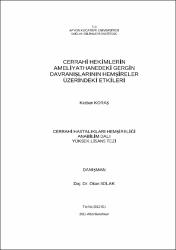Cerrahi Hekimlerin Ameliyathanedeki Gergin Davranışlarının Hemşireler Üzerindeki Etkileri
Künye
Koraş,Kezban. Cerrahi Hekimlerin Ameliyathanedeki Gergin Davranışlarının Hemşireler Üzerindeki Etkileri. Afyonkarahisar:Afyon Kocatepe Üniversitesi, 2012.Özet
Amaç: Cerrahi branştaki hekimlerle beraber çalışan hemşirelerin aralarında gerginliğe neden olan olayların tespiti ve bu durumun hemşirelerin iş motivasyonuna yansımasının belirlenmesidir.
Giriş: Ortak uğraşı alanı hasta bireyin bakımı ve tedavisi olan hekimlerle hemşirelerin ilişkileri bireysel olmasının yanı sıra çalıştıkları kuruma, hitap ettikleri topluma, aldıkları mesleki eğitime ve mensubu oldukları mesleki örgütlere bağlı olarak da şekillenir. Bu durum her meslek grubunda olduğu gibi koordinasyonda sıkıntılara yol açarak çatışmalara neden olur. Hekim–hemşire ilişkisinin anlaşılması ve aradaki anlaşmazlıkların çözülmesi sayesinde daha etkin ve daha güvenli hasta bakımı sağlanacak, dolayısıyla hastanelerin ve diğer sağlık kurumlarının işleyişi kolaylaşacaktır.
Materyal ve metod: Çalışmamız, Afyon, Ankara, Bursa, İstanbul, Karaman, Konya illerindeki üniversite, eğitim-araştırma, devlet ve özel hastanelerinin ameliyathanesinde belirtilen tarihler arasında görev yapan 550 ameliyat hemşiresinden oluşmaktadır. Araştırmada örneklem seçimine gidilmemiş, araştırmaya katılmayı kabul eden ve araştırmanın yapıldığı tarihlerde kurumda bulunan 100 hemşire araştırma kapsamına alınmıştır. Araştırma verileri anket formu aracılığı ile toplanmıştır. Ameliyat hemşirelerine uygulanan anket formu 29 sorudan oluşmaktadır. Ayrıca Maslach Tükenmişlik Envanteri ile Sürekli Öfke ve Öfke İfade Tarzı Ölçeği uygulanmıştır. Araştırmaya katılan ameliyat hemşirelerine yönelik ankette yaş, cinsiyet, mezun olunan okul, meslekteki toplam çalışma süresi, ameliyat hemşiresi olarak çalışma süresi ve görev alınan cerrahi bölümler, çalışma ortamından memnuniyet durumu,
gergin davranışlara neden olan durumlar ve bu davranışlara tepkileri belirleyici sorular sorulmuştur. Bulgular: Çalışma kapsamına alınan hemşirelerin yaş ortalaması 32,8 ± 7,13
olup (min: 21 – max: 48), %51’inin önlisans mezunu olduğu ve %56’sının devlet hastanesinde çalıştığı saptanmıştır. Katılımcıların %66’sı 2 yıl ve üzerinde ameliyethane hemşireliği yapmış, %77’si gece-gündüz vardiyalı sistemde çalışan, meslekte çalışma süreleri ortalama 12 yıl olan hemşirelerdir. Çalışmamızda cerrahi hekimlerin ameliyathanedeki gergin davranışlarına hemşirelerin %96’sının maruz kaldığı, bu durumdan olumsuz yönde etkilendikleri (%49) ve bu davranışlar karşısında öfkelendikleri; ancak belli etmedikleri (%52,06) görülmüştür. Cerrahları ameliyathanede sinirlendiren olayların genellikle çevresel
faktörlerden kaynaklandığı (%46,5) düşünülmektedir. Katılımcıların %97’si bu davranışları doğru bulmadığını ifade etmektedir. Ayrıca bu tür davranışların cerrahların kişisel problemlerinden kaynaklandığı ve engellenemeyeceği (%36,47) düşünülmektedir. Hemşirelerin eğitim düzeyinin yaşanan gerginlikte etkisi olduğu, bu gerginliklerin en sık üniversite veya eğitim-araştırma hastanelerinde meydana geldiği gözlenmiştir. Genellikle genel cerrahi bölümünde gerginlik yaşandığı gözlenirken bu durumun hemşire-doktor ilişkilerini de kötü etkilediği, cerrah-hemşire gerginliklerinde en sık rastlanan sebeplerin teknik yetersizlikler olduğu, gerginliğin ameliyatın ortasında en sık görüldüğü, önemli ameliyatlarda gerginliğin daha çok olduğu, cerrahların tepkilerini en sık yüksek sesle bağırarak dışarı vurduğu, bu durumun hemşirelerce onaylanmadığı ancak tepki göstermeden işlerine devam ettikleri görülmüştür.
Sonuç: Çalışmamız, cerrahi hekimlerin gösterdikleri negatif tepkilerden hemşirelerin çoğunun olumsuz etkilendiğini, bu durumun performanslarını düşürdüğünü göstermektedir. Bu tür davranışlara maruz kalan hemşirelerin tükenmişlik ve öfke ölçeği puanlarının yüksek olduğu belirlenmiştir. Purpose: To determine the events giving rise to tension between nurses working with physicians in branch of surgery; and its reflection on their work motivation.
Introduction: Relationship between nurses and physicians, common occupational areas of whom are patient care and treatment, is shaped depending onthe institution they work, the community they appeal to, their professional training and professional associations. In this case, it leads to conflicts causing difficulties in coordination, as in every occupational group. Through understanding the relationship between physicians and nurses; and resolving conflicts between them, more efficient and safer patient care will be provided; and thus, the operation of hospitals and other health institutions will be easier.
Material and method: Our study consist of 550 surgical nurses working in operating rooms in university hospitals, training and research hospitals, publichospitals and private hospitals in Afyon, Ankara, Bursa, İstanbul, Karaman, Konya, between the dates indicated. In the study, no sample selection has been made; 100 nurses, who accept to participate and are available in the institution, have been included. Data of the research have been obtained through questionnaires. The questionnaire administrated to the surgical nurses consists of 29 questions. Additionally, Maslach Burnout Inventory-Trait Anger Expression Scale has been
used. Questions determining age, gender, school of graduate, total working time, total time of working as a surgical nurse, surgical departments they worked in, status of satisfaction with the working place, situations causing tense behaviors and the reactions, have been asked.
Findings: The average age of the nurses included was 32,8 ± 7,13(min: 21 – max: 48); %51 of them were graduates of associate degree and %56 worked in public hospitals. %66 of the participants worked as surgical nurses for more than 2 years, %77 of them, working in day and night shift system, worked in the profession for an average of 12 years. In our study, it is seen that %96 of the nurses are exposed to tense behaviors of physicians working in operating rooms; that they are negatively affected(%49); and that they were furious with these behaviors; but did not express (%52,06). It is thought that the events breaking the nerves of the physicians are usually caused by environmental factors (%46,5). %97 of the participants indicates that they do not identify these behaviors correct. In addition, it is thought that these
behaviors derive from personal problems of the physicians and cannot be prevented (%36,47). It is observed that the educational level of the nurses affects tension; and that the tension is most frequently observed in university hospitals or in training and research hospitals. It is concluded that tension is observed usually in general surgical department; it affects relationship between physicians and nurses negatively; the reasons most frequently met in tension between physicians and nurses are technical inadequacies; the tension is most frequently observed during surgeries; there is more tension in major surgeries; the physicians express their tension by shouting out loud; the nurses do not approve this behavior but continue working without any reactions.
Conclusion: In our study shows that, because of the negatives reactions of the surgeries to the nurses in the operatig room most of the nurses effected adversely and
this situation reduces the performance of the nurses.
The nurses who undergo this situation has shown that burnout ınventory and Trait Anger Expression Scala points has gone up is determined.
Bağlantı
http://hdl.handle.net/11630/2321Koleksiyonlar
- Yüksek Lisans Tezleri [635]



















